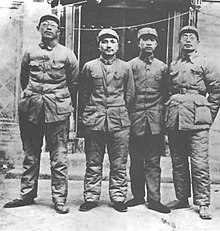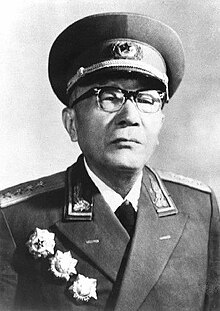Huang Kecheng

Huang Kecheng ( Chinese 黃克誠 / 黄克诚 , Pinyin Huáng Kèchéng , W.-G. Huang K'o-ch'eng ; * 1902 in Yongxing County ( Hunan ), † December 28, 1986 in Beijing ) was a Chinese general in the Red Army or the People's Liberation Army . He fought in the war against Japan and in the civil war . After the proclamation of the People's Republic, he was Deputy Chief of Staff of the People's Liberation Army and General Secretary of the Central Disciplinary Commission .
Huang, who came from a peasant family, studied at the 3rd Teacher Training Institute in Hunan Province and joined the National Revolutionary Army after completing his training . In 1925, shortly before the start of the Northern Campaign and during the First United Front , Huang joined the Chinese Communist Party . After the Shanghai massacre he was given the task of organizing uprisings in South Hunan, but after the Yongxing uprising he retired to the Jinggangshan base and joined the 3rd Division of the 4th Chinese Red Army in which he was a political member Commissioner acted. He was a participant in the Long March . Upon arriving in Yan'an , he was appointed director of the Red Army Organization and Policy Department. In the war against Japan he was political commissar of the 334th Brigade of the 115th Division of the 8th March Army under Lin Biao and fought with the troops led by Xu Haidong in Shanxi , Hebei and Henan . Over time, he rose to become political commissar of the 8th March Army and, after the Battle of Huangqiao , the 4th New Army . During the Chinese Civil War he was deputy commander of the United Democratic Army of Northeast China and the 4th Field Army , where he was involved in fighting against Du Yuming's forces. In the Battle of Siping , Huang and Lin conflicted because Huang did not agree with Lin's decision to resist and wanted to retreat. Towards the end of the civil war, Huang was elected a member of the Central Committee.
After the People's Liberation Army marched into Beijing and Tianjin , Huang was appointed party secretary for Tianjin. After the proclamation of the People's Republic of China, Huang was appointed secretary of the Hunan Party Committee and commander of the People's Liberation Army in Hunan. After his transfer to Beijing, he chaired the General Staff of the People's Liberation Army, the logistics department of the People's Liberation Army, and later became Deputy Minister of Defense. In 1955 he was appointed Grand General for his services , he rose to General Secretary of the Central Military Commission and became Chief of Staff.
In 1959, Huang was part of the group led by Peng Dehuai , the Mao Zedong's policy of Great Leap forward and the people's communes criticized. Mao was enraged, accused the leadership of the People's Liberation Army of disloyalty and announced that he could once again withdraw to the mountains and build a new Red Army. Peng, Huang and some other high party officials such as Luo Fu , Zhou Xiaozhou and Li Rui lost their posts, and an investigation was launched against Huang for several years. During the Cultural Revolution , Huang suffered physical abuse. After Mao's death, however, he was rehabilitated and became an advisor to the Central Military Commission, a member of the Central Committee and, from 1982 to 1985, Second Secretary General of the Central Disciplinary Commission. Despite the humiliations he suffered, he defended Mao's achievements when Deng Xiaoping was building his system of government and had to develop an official party position on the turmoil of the Great Leap and the Cultural Revolution.
Web links
Individual evidence
- ↑ a b c Xiaoxiao Li: Huang Kecheng . In: Xiaobing Li (Ed.): China at War - An Encyclopedia . ABC-CLIO, 2012, ISBN 978-1-59884-416-0 , p. 176-177 .
- ↑ Christopher R. Lew and Edwin Pak-wah Leung: Historical dictionary of the Chinese Civil War . 2nd Edition. Scarecrow Press, Lanham 2013, ISBN 978-0-8108-7874-7 , pp. 89-99 .
- ↑ Alexander V. Pantsov and Steven I. Levine: Deng Xiaoping, a revolutionary life . Oxford University Press, New York 2015, ISBN 978-0-19-062367-8 , pp. 202 .
- ↑ Alexander V. Pantsov and Steven I. Levine: Mao: The Real Story . Simon & Schuster, New York 2007, ISBN 978-1-4516-5447-9 , pp. 464-465 .
- ↑ Ezra F. Vogel: Deng Xiaoping and the Transformation of China . Harvard University Pess, 2011, ISBN 978-0-674-05544-5 , pp. 367-367 .
| personal data | |
|---|---|
| SURNAME | Huang, Kecheng |
| ALTERNATIVE NAMES | 黄克诚; 黃克誠; Huang K'o-ch'eng; Huáng Kèchéng |
| BRIEF DESCRIPTION | Chinese General of the People's Liberation Army and politician |
| DATE OF BIRTH | 1902 |
| PLACE OF BIRTH | Yongxing , Hunan |
| DATE OF DEATH | December 28, 1986 |
| Place of death | Beijing |
